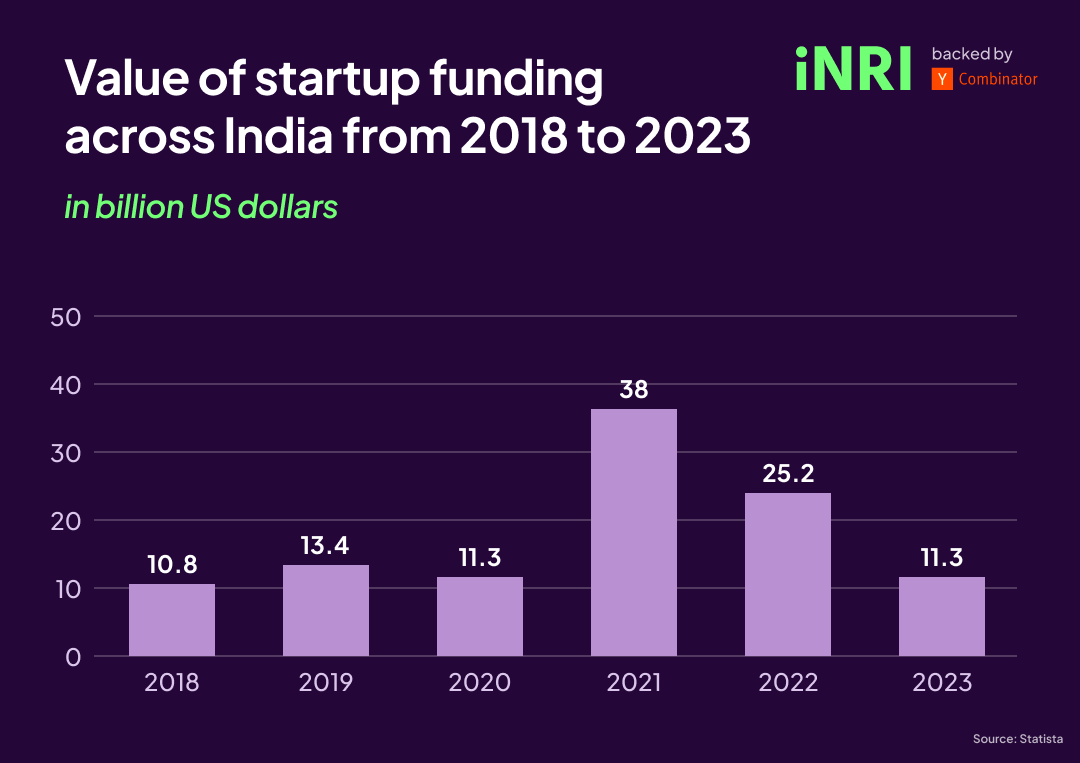Can NRIs Invest in Indian Startups?
Have you ever dreamt of investing in Indian startups but weren’t sure if it was possible for NRIs?
Good news—it absolutely is! While the process is a bit different from investing in stocks or mutual funds, NRIs can definitely invest in Indian startups.
Indian Startup Landscape
The Economic Survey 2024 highlights the dynamic growth of India's startup ecosystem, revealing that over 45% of startups have emerged from Tier 2 and Tier 3 cities. The number of Department for Promotion of Industry and Internal Trade (DPIIT) recognized startups has surged to over 1.25 lakh by March 2024, up from just 300 in 2016.
In recent years, India’s startup ecosystem has grown rapidly, becoming the world’s third largest in terms of unicorn count (privately held companies valued at over $1 billion), collectively valued at $349.67 Bn. The fintech, edtech, health tech, and SaaS sectors are driving the highest growth. As of 2024, India boasts over 110 unicorns.
What is Startup Investing?
Startup investing refers to purchasing equity in early-stage companies, often before they have fully proven their product market fit. Investors provide capital in exchange for ownership stakes, with the hope that the startup will scale, generate significant revenue, and eventually go public (or be acquired) at a much higher valuation.
The appeal of startup investing lies in its potential for outsized returns. Early investors in companies like Flipkart or Zomato saw tremendous gains when these firms grew into unicorns and went public. However, startup investing comes with a higher risk than traditional asset classes like real estate or public equities, as most startups fail to reach maturity.
High Returns - Some Quick Numbers
To put things in perspective
Investing in startups has the potential for high returns in the long term, as these companies can rapidly scale up and disrupt the market.
For instance, if you invested just Rs 1 lakh in
Flipkart in 2009, you could have made Rs 60 Crs in 2020, when Walmart acquired the e-commerce giant.
OYO in 2013, you could have made Rs 50 Crs INR in 2021, when the hospitality startup was valued at $ 9 billion.
Swiggy in 2014, you could have easily made Rs 30 Crs in 2021, when the food delivery startup was valued at $ 5.5 billion.
How Much Money Has Been Invested in Indian Startups?
Can NRIs Invest in Indian Startups?
Yes, NRIs can legally invest in Indian startups. India’s government has actively encouraged foreign investments, including NRI participation, to boost the startup ecosystem. As per the Foreign Exchange Management Act (FEMA), NRIs can invest through several routes, including:
Direct Investment: NRIs can invest directly in startups like foreign investors.
Venture Capital Funds (VCFs): NRIs can invest in SEBI-registered Venture Capital Funds, which pool resources to invest in promising startups.
Alternative Investment Funds (AIFs): NRIs can also invest in AIFs targeting early-stage companies.
The Reserve Bank of India (RBI) has ensured a streamlined regulatory process for NRIs investing in startups, making it easier to repatriate gains.
RBI has set limits for NRI investments in Indian startups. These vary by sector, with total NRI investments typically capped at 10% or 24% of the startup’s paid-up capital.
Additionally, no individual NRI can hold more than 5% of the company’s paid-up capital.
Key Considerations for NRIs
India’s startup ecosystem presents exciting opportunities, but NRIs should be aware of certain factors when making investments:
Repatriation Rules: NRIs can invest using NRO (Non-Resident Ordinary), NRE (Non-Resident External), or FCNR (Foreign Currency Non-Resident) accounts. Investments through NRO accounts are non-repatriable, meaning you can’t transfer the capital or profits out of India. However, investments made through NRE or FCNR accounts are fully repatriable, allowing you to move both your initial investment and returns abroad.
Types of Securities: NRI investments in startups are classified as Foreign Direct Investment (FDI) when they involve specific types of securities such as equity shares with voting rights, fully and mandatorily convertible preference shares, or convertible debentures.
Pricing Guidelines: The RBI has specific pricing rules for NRI investments in startups. For example, equity shares must be priced based on their Fair Value, determined by a SEBI-registered Merchant Banker or Chartered Accountant using the Discounted Free Cash Flow (DCF) method. Similar rules apply to other convertible securities.
Tax Implications:
Short-term capital gains (for investments held under 24 months) are taxed at 15% for NRIs with a valid PAN card. Without a PAN card, the rate jumps to 30%.
Long-term capital gains (for investments held over 24 months) are taxed at 10% with a valid PAN card. Without one, the tax rate increases to 20%.



